On 8th March 2024, which also doubled as International Women’s Day, Rural Aid Foundation held a community Open Data Day event titled “Empowering migrant and refugee women to use open data to hold duty bearers accountable for quality sexual reproductive health services“. This event was directly linked to the advancement of SDG 3: Good health and well-being. The event took place in Nyamarunda sub-county, Kibaale district, Uganda and it was aimed at exploring the use of open Sexual Reproductive Health data (readily available and freely accessible) from public health facilities as a tool to hold duty bearers such as humanitarian agencies, refugee leaders and health service providers accountable to deliver quality Sexual reproductive health service for refugee and migrant women in Kibaale.
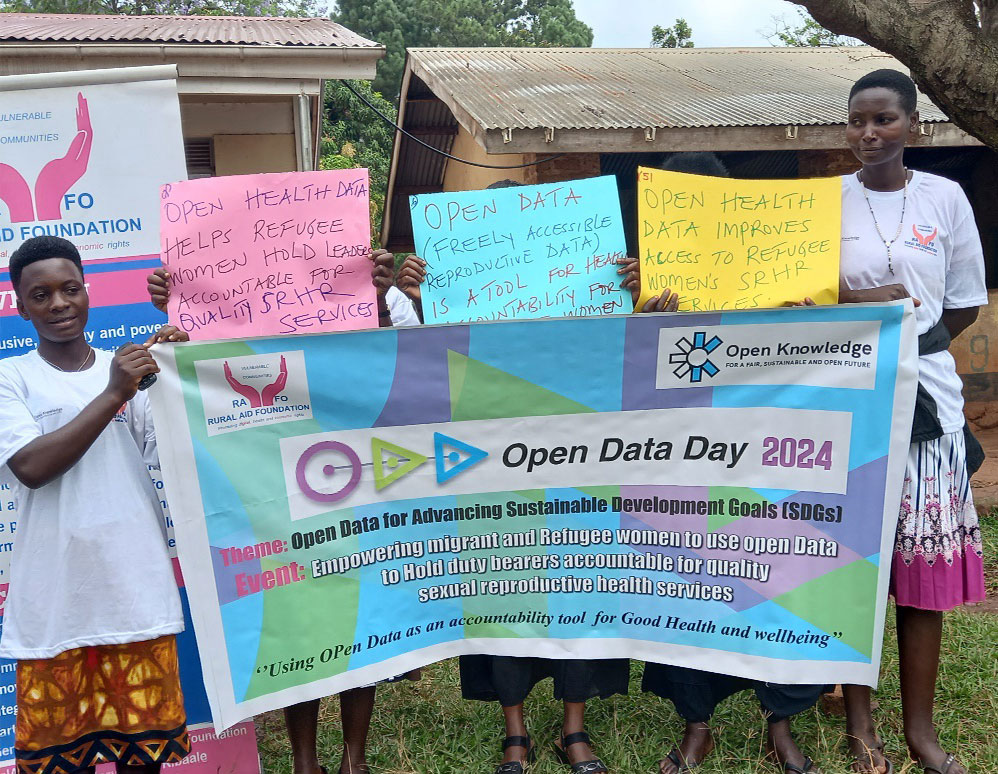
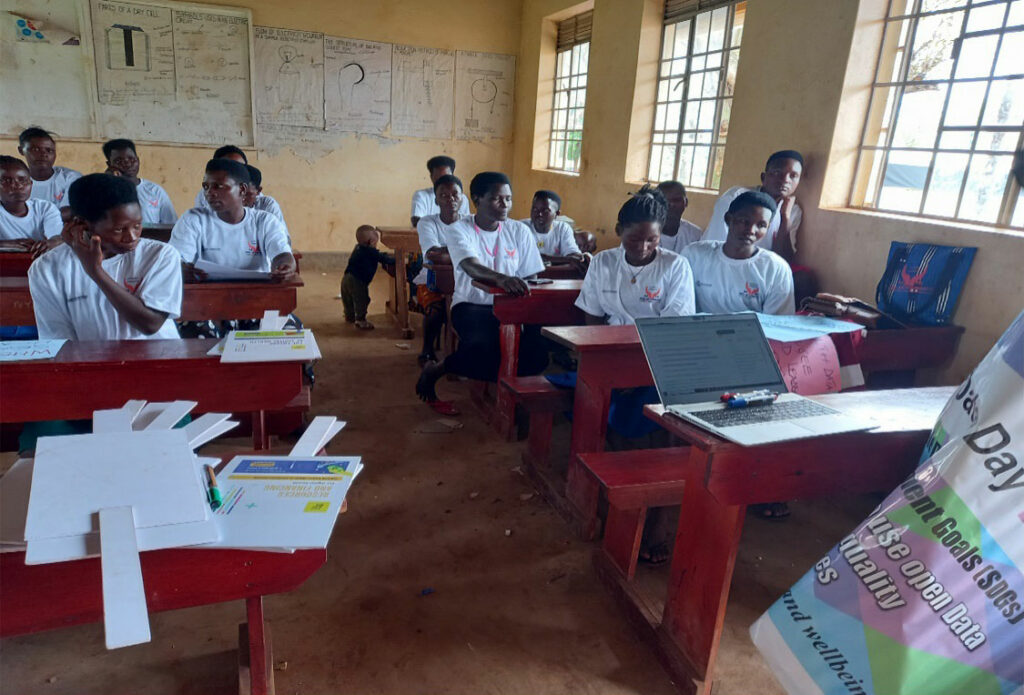
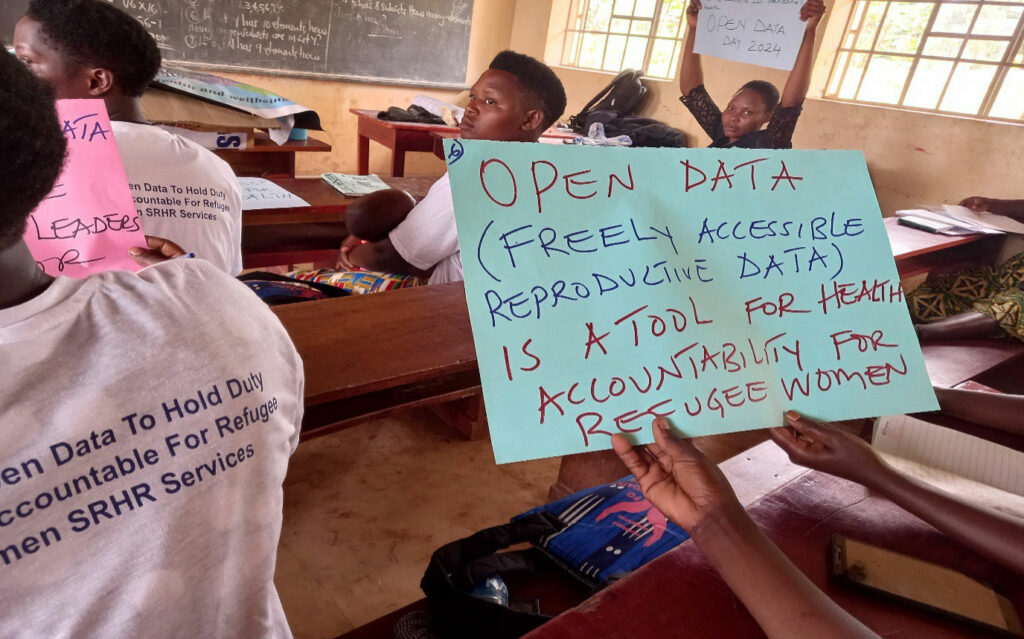
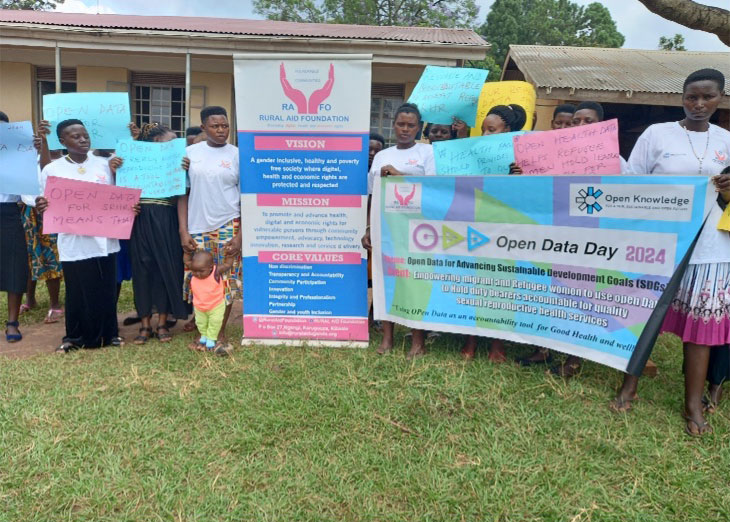
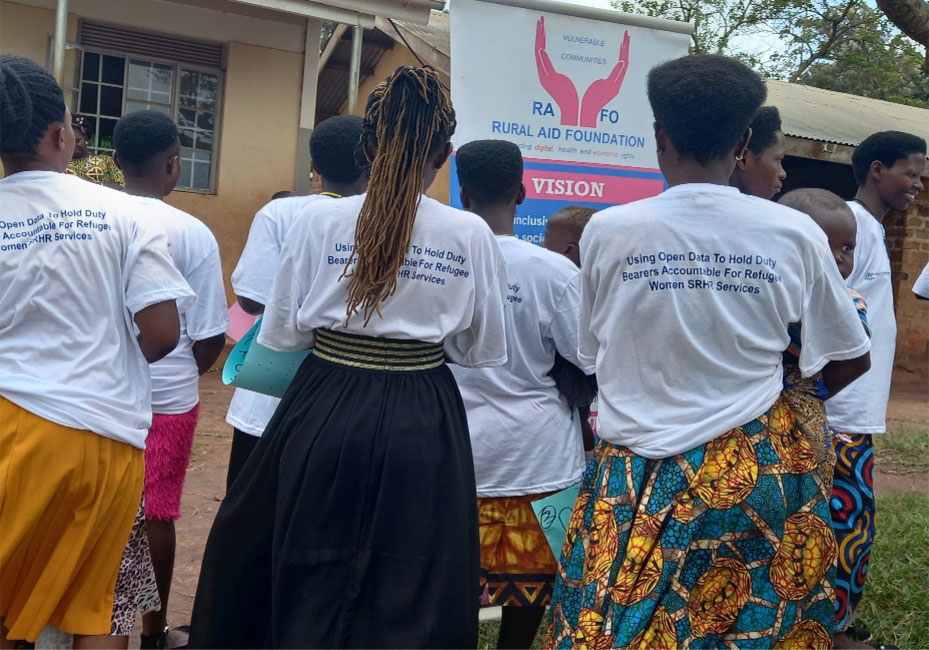
Activity 1: Mobilized and oriented a pool of 60 rural migrant refugee women and girls and 10 women-led community organizations on the concept of open data and how to use open data to hold duty bearers accountable for providing quality SRHR services
Rural Aid Foundation mobilized a pool of 60 rural migrant refugee women and girls and women-led community organizations and oriented them on the concept of open data and how to use open data as a tool to hold duty bearers accountable in providing quality SRHR services for refugees and migrants. The orientation that was conducted by Ms Scovia Mbabazi covered a basic introduction to open data and the dimensions of open data in the context of Sexual Reproductive Health and Rights (SRHR) including;
- Availability and access: That data must be available and accessible as a whole or at a reasonable or affordable cost. In the context of sexual reproductive health data, this means that sexual reproductive health data should be available to refugees and anyone who needs it to improve the quality of health of refugees. Health facilities in refugee settings should ensure the availability and accessibility to data related to maternal and newborn health, contraception, safe abortion and post-abortion care, and Gender-based violence. The data should be available to anyone who needs it in a convenient and modifiable form.
- Re-use and Redistribution: The SRHR data available in the health facilities in the refugee settlement or emergency settings must allow re-use, redistribution, and intermixing with other data sets to enable duty bearers to make decisions to address issues related to the quality of SRHR services provided.
- Universal participation: The data should be available for use, re-use and redistribution across a range of fields and stakeholders, including refugees, migrants and duty bearers such as health service providers to improve the quality of services.
The facilitator further discussed eight open government data principles developed in 2007 by 30 open government advocates and these were discussed in the context of SRHR for refugees noting that public SRHR data shall be considered open if it is made public in a way that complies with the following eight principles:
- Complete: All public SRHR is made available and is not subject to valid privacy, security or privilege limitations.
- Primary: Data is as collected at the source such as health facility registers and health management systems with the highest level of quality and not modified in any form.
- Timely: Data should be provided as quickly as possible when it is needed to enable duty-bearers to use it for decision-making.
- Accessible: Data is available to a range of stakeholders for a range of different purposes.
- Machine processable: Data should be easily processed and used in any form as required by the user.
- Non-discriminatory: Data is available to anyone, with no requirement of authentication or registration required.
- Non-proprietary: Data should be available to everyone without anyone claiming control over the data. It should be publicly available health data. Data is available in a format over which no entity has exclusive control.
- License-free: Data should not be subject to any copyright patent or trade secret regulation. However, reasonable privacy and security to protect the rights of patients.
Due to the sensitive nature of SRHR data, participants recognized some ethical issues that must be upheld to ensure the rights of refugees and migrants are upheld in the use of open data.
‘’Some SRHR data such as HIV test results, post abortion data, cervical cancer test results cannot be open to everyone to access especially if it includes personal information such as the name of the patients. It is important to note that open data usage in refugee settings to hold duty bearers accountable must ensure the rights of refugee patients are protected’’
Health facility in charge, Bjubuli Health Center
To ensure these ethical and human rights issues are understood by all the participants, the facilitator discussed privacy, confidentiality and informed consent issues in accessing open health data.
- Privacy: This refers to the fact that all SRHR data to be accessed, reused and shared must ensure the privacy of the ‘’data owners’’ – the patients and no personal information such as names should be shared along with open data. Health facilities should not provide SRHR data for refugees with personal identifying information such as names.
- Confidentiality: Any health data such as HIV status data should not be put in the public domain provided it holds or contains personal identifying data such as names of a patient.
- Informed consent: Health service providers should always ensure the ‘’data owners’’ are notified why their data is being shared with anyone and the data should be availed for reasons that help to benefit and improve refugee health outcomes or to improve the quality of SRHR services.
Activity 2: Worked with migrant refugee women/girls and organizations to identify and document Sexual Reproductive Health and Rights service quality gaps/issues using publicly accessible data from Kibaale community health facility
Rural Aid Foundation worked with migrant refugee women/girls and organizations to document Sexual Reproductive Health and Rights service quality issues such as lack of SRHR commodities such as condoms, lack of cervical cancer screening services, lack of adequate family planning services using publicly accessible data the community health facility information registers. These were presented to duty bearers for corrective action to be taken.
Activity 3: Conducted a flash mob to create awareness on awareness on open data issues and their implications Good health and wellbeing (SDG3)
Rural Aid Foundation worked with migrant women and girls to hold flash mobs in Kibaale town to create community awareness on open data issues and their implications on achieving SDG 3. Rural women ambassadors held a match and flashmob to further create community awareness of open data as a tool to hold duty bearers accountable for quality SRHR services for refugees to achieve Universal Health Coverage (SDG 3). During the flash mobs, the migrant women and refugees displayed messages calling upon duty bearers to ensure access to data at health facilities as a tool for migrant women and refugees to demand quality SRHR services.
Activity 4: Hold a peaceful match at Kibaale district headquarters to present the open data issues identified by the Kibaale community health facility to the district health officer and other district leaders to seek corrective action.
The migrant women were matched to Kibaale Health Center IV, where they presented issues discussed under Activity 2 to duty bearers for corrective action to be taken. The duty bearers through the district biostatistician committed to ensuring all health facility health data clerks extract and publish sexual reproductive health services and delivery data from the health management information system and avail it to community members via the community note boards.
Conclusion
Open data can be used by community members to hold service providers accountable for improving the quality of sexual reproductive health services in refugee settings.
About Open Data Day
Open Data Day (ODD) is an annual celebration of open data all over the world. Groups from many countries create local events on the day where they will use open data in their communities.
As a way to increase the representation of different cultures, since 2023 we offer the opportunity for organisations to host an Open Data Day event on the best date within a one-week period. In 2024, a total of 287 events happened all over the world between March 2nd-8th, in 60+ countries using 15 different languages.
All outputs are open for everyone to use and re-use.
In 2024, Open Data Day was also a part of the HOT OpenSummit ’23-24 initiative, a creative programme of global event collaborations that leverages experience, passion and connection to drive strong networks and collective action across the humanitarian open mapping movement
For more information, you can reach out to the Open Knowledge Foundation team by emailing opendataday@okfn.org. You can also join the Open Data Day Google Group to ask for advice or share tips and get connected with others.








